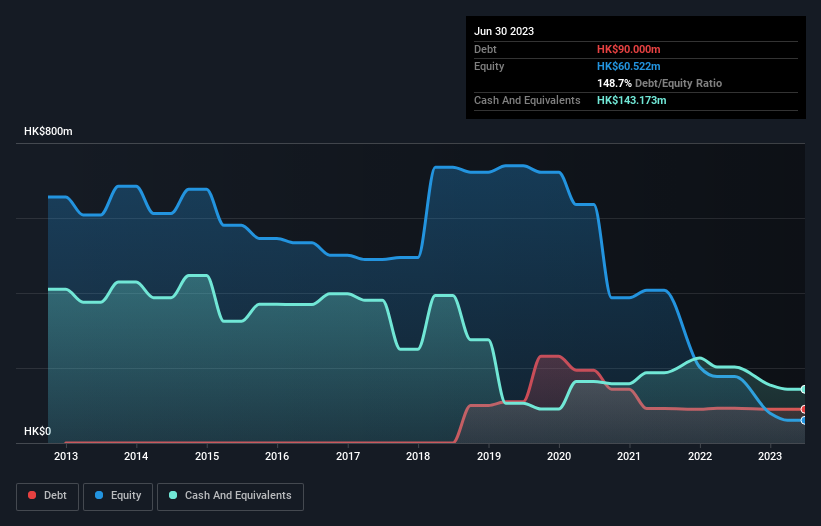
Warren Buffett famously said, 'Volatility is far from synonymous with risk.' So it seems the smart money knows that debt - which is usually involved in bankruptcies - is a very important factor, when you assess how risky a company is. We note that Bison Finance Group Limited (HKG:888) does have debt on its balance sheet. But should shareholders be worried about its use of debt?
Why Does Debt Bring Risk?
Debt assists a business until the business has trouble paying it off, either with new capital or with free cash flow. Part and parcel of capitalism is the process of 'creative destruction' where failed businesses are mercilessly liquidated by their bankers. While that is not too common, we often do see indebted companies permanently diluting shareholders because lenders force them to raise capital at a distressed price. Of course, the upside of debt is that it often represents cheap capital, especially when it replaces dilution in a company with the ability to reinvest at high rates of return. The first step when considering a company's debt levels is to consider its cash and debt together.
See our latest analysis for Bison Finance Group
What Is Bison Finance Group's Net Debt?
As you can see below, Bison Finance Group had HK$90.0m of debt, at June 2023, which is about the same as the year before. You can click the chart for greater detail. However, it does have HK$143.2m in cash offsetting this, leading to net cash of HK$53.2m.

How Strong Is Bison Finance Group's Balance Sheet?
Zooming in on the latest balance sheet data, we can see that Bison Finance Group had liabilities of HK$116.7m due within 12 months and liabilities of HK$7.48m due beyond that. Offsetting these obligations, it had cash of HK$143.2m as well as receivables valued at HK$32.3m due within 12 months. So it actually has HK$51.3m more liquid assets than total liabilities.
This surplus liquidity suggests that Bison Finance Group's balance sheet could take a hit just as well as Homer Simpson's head can take a punch. With this in mind one could posit that its balance sheet means the company is able to handle some adversity. Simply put, the fact that Bison Finance Group has more cash than debt is arguably a good indication that it can manage its debt safely. There's no doubt that we learn most about debt from the balance sheet. But you can't view debt in total isolation; since Bison Finance Group will need earnings to service that debt. So when considering debt, it's definitely worth looking at the earnings trend. Click here for an interactive snapshot.
Over 12 months, Bison Finance Group made a loss at the EBIT level, and saw its revenue drop to HK$6.0m, which is a fall of 88%. That makes us nervous, to say the least.
So How Risky Is Bison Finance Group?
We have no doubt that loss making companies are, in general, riskier than profitable ones. And the fact is that over the last twelve months Bison Finance Group lost money at the earnings before interest and tax (EBIT) line. And over the same period it saw negative free cash outflow of HK$12m and booked a HK$117m accounting loss. With only HK$53.2m on the balance sheet, it would appear that its going to need to raise capital again soon. Overall, its balance sheet doesn't seem overly risky, at the moment, but we're always cautious until we see the positive free cash flow. There's no doubt that we learn most about debt from the balance sheet. However, not all investment risk resides within the balance sheet - far from it. To that end, you should be aware of the 4 warning signs we've spotted with Bison Finance Group .
If you're interested in investing in businesses that can grow profits without the burden of debt, then check out this free list of growing businesses that have net cash on the balance sheet.
Valuation is complex, but we're here to simplify it.
Discover if Bison Finance Group might be undervalued or overvalued with our detailed analysis, featuring fair value estimates, potential risks, dividends, insider trades, and its financial condition.
Access Free AnalysisHave feedback on this article? Concerned about the content? Get in touch with us directly. Alternatively, email editorial-team (at) simplywallst.com.
This article by Simply Wall St is general in nature. We provide commentary based on historical data and analyst forecasts only using an unbiased methodology and our articles are not intended to be financial advice. It does not constitute a recommendation to buy or sell any stock, and does not take account of your objectives, or your financial situation. We aim to bring you long-term focused analysis driven by fundamental data. Note that our analysis may not factor in the latest price-sensitive company announcements or qualitative material. Simply Wall St has no position in any stocks mentioned.
About SEHK:888
Bison Finance Group
An investment holding company, provides media sales, design services, and production of advertisements for transit vehicle exteriors and interiors, shelters, and outdoor signage advertising business in Hong Kong.
Excellent balance sheet very low.
Market Insights
Community Narratives





